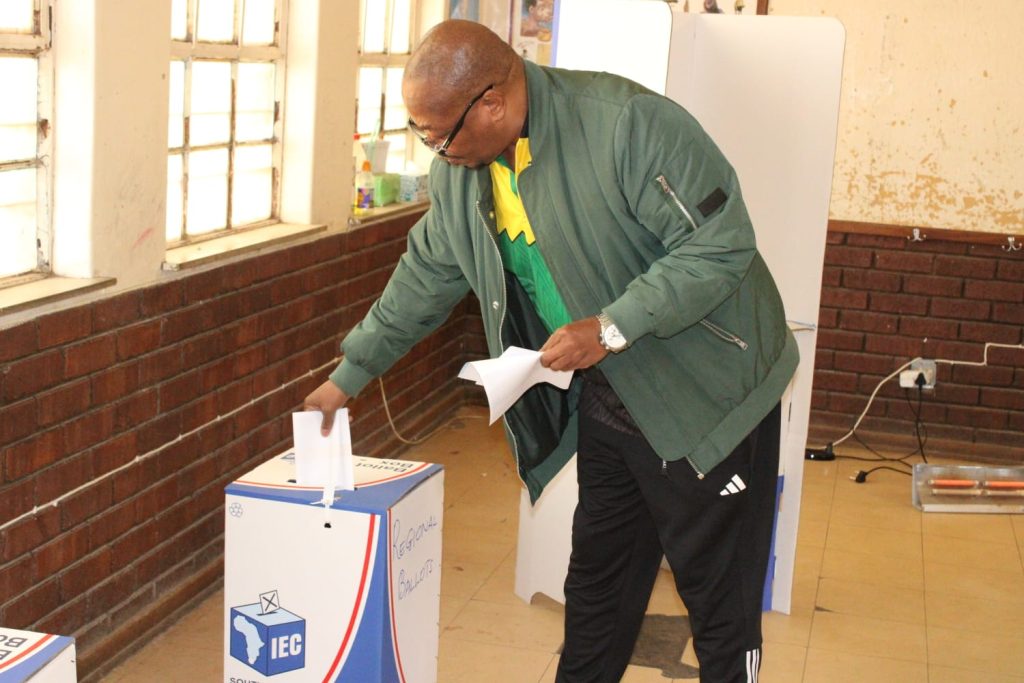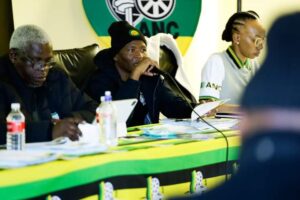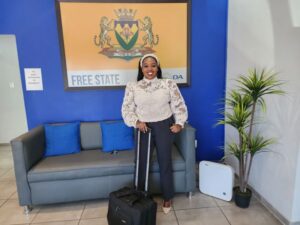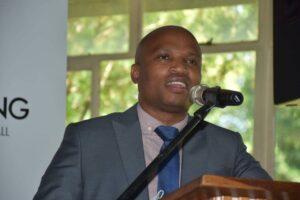By Libuseng Nyaka
QWAQWA – When some voters, especially the youth, said they wanted change and others said they would vote for continuity, they were not just joking as they came out in high numbers to ensure their eagerness becomes a reality through their vote on Wednesday May 29 , 2024.
Despite long queues and late voting, young people who are known to lack patience were determined to wait until the last minutes just to cast their ballots.
Mbali Mbatha (19), a student and first time voter said she believes her vote will bring change to their suffering in the higher education.
“I came here very early just to make sure that I have an opportunity to cast my vote. Not even long queues were going to stop me. I was going to wait. I have voted to bring change. My vote gives me power and enables me to be part of the decision that will change our lives for the better.”
Sharing her experience as first time voter, Mbatha said her concern was to ensure that her ballot is not spoilt.
“It has been a good experience. I was overwhelmed by the long list of political parties, but I took time to ensure that I put my mark on the party of my choice, that will bring the change I am yearning for.”
Another voter Ditsitsho Rantho (23) said her reason to vote is to maintain continuity.
“As a young person, I have listened to the manifestoes of all the political parties and I have voted for the party that will continue to serve us. I have voted for the party that has experience in governing despite its flaws,” she said.
The former executive mayor of Thabo Mofutsanyana district municipality and current CEO of Universitas Academic hospital said he travelled from Bloemfontein to Qwaqwa to cast his vote where he has registered, for continuity.
“ This democracy that we are enjoying today did not come easy. Some people died just for us to benefit. I am here to ensure that there is continuity. I am also unhappy with the poor service delivery, but I do not think I can vote for change. I have voted for an organisation of my choice; I am just exercising that responsibility. My vote will enable us to continue where we have started. South Africa has come a long way.”
“I am very excited to have voted and also because this is he 30th year of democracy in South Africa. In order for democracy to work we have participated in one way of another, voting is one of those ways of participating and will help us in making decisions at regional, provincial and national level, to make a difference in the country.
“I am pleased, it is not only for voting for me but the country.”
Another doctor who is also a former CEO of Mofumahadi Manapo hospital who currently works as clinical manager at he same hospital DR S.J Moloi had this to say:
“I am very excited to have voted and also because this is our 30th year in democracy in South Africa. In order for democracy to work we have participated in one way or another and voting is one of those ways of participating which will help us in making decisions at regional, provincial and national level too make a difference in the country. I am pleased, I was not only for voting for me but the whole country.”

Casting his vote former executive mayor of Thabo Mofutsanyana district municipality and current CEO at Universitas Academic Hospital Dr Balekile Mzangwa.
However, Siphiwe Manyoni suspects that some of the voters will mix the ballot papers by dropping them in the wrong boxes.
“I think many people who come to vote must be very careful because this is a very new experience. We’ve never done this in South Africa, but it was not very difficult as long as you know the political party or candidate you want to vote for. It has even been simplified because there is a face of the leader on the ballot. The challenges could be after receiving these three ballots papers and making your mark on each; one might drop the papers in the wrong boxes. There are three boxes marked Provincial, Regional and National. One can easily drop the ballot paper for provincial in the regional box unless IEC staff will sort them after voting. It has been an easy experience.”
According to data from the Electoral Commission of South Africa (IEC), a total of 27,753,059 South Africans registered to vote, with a gender distribution of 44.76% men and 55.24% women.
The country hosts 1,792 registered political parties vying for the vote of these 27 million South Africans.






More Stories
FS ANC slams Youth League
Free Stater gets high position in DA
City manager in appointment controversy